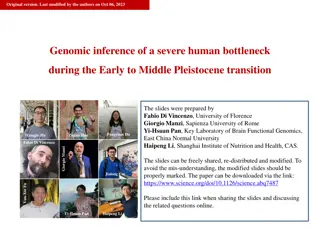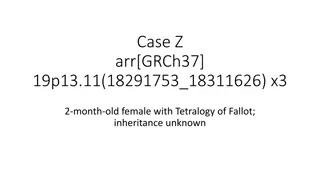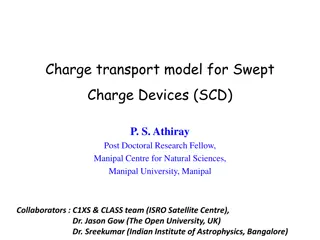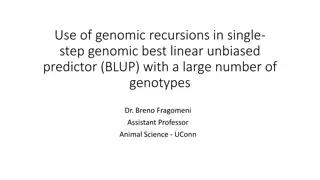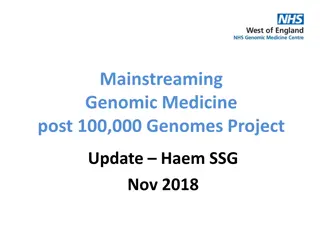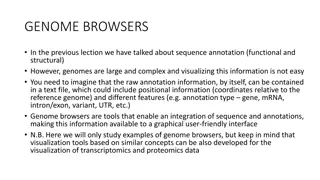Genomic Research in SCD
Prevalence of Sickle Cell Disease (SCD) is higher in populations of African origin, necessitating a focus on genetic, environmental, and socio-economic factors affecting SCD in Africa. Research aims to address the dearth of empirical data, enhance technological applications, and promote collaborative initiatives for better disease management. Ethical considerations and patient-centered issues also play a crucial role in advancing SCD research.
Download Presentation

Please find below an Image/Link to download the presentation.
The content on the website is provided AS IS for your information and personal use only. It may not be sold, licensed, or shared on other websites without obtaining consent from the author.If you encounter any issues during the download, it is possible that the publisher has removed the file from their server.
You are allowed to download the files provided on this website for personal or commercial use, subject to the condition that they are used lawfully. All files are the property of their respective owners.
The content on the website is provided AS IS for your information and personal use only. It may not be sold, licensed, or shared on other websites without obtaining consent from the author.
E N D
Presentation Transcript
Genomic Research in SCD Presented @ 2017 SCSSN Conference Dr. Titi Adeyemo College of Medicine, University of Lagos/Lagos University Teaching Hospital
Introduction: Prevalence Sickle Cell Disease (SCD) is a global health problem. However, it mostly affects people of African origin compared with other ethnicities. About 90% global births with SCD are in Africa About 1 in 12 African Americans are carriers. In Africa, there are 2 deaths compared with 0.13 deaths per 100 patient-years in the USA.
Introduction: Factors affecting SCD SCD is affected by various factors Genetic factors Environmental factors. Socio-economic factors Interactions of these factors in African settings are bound to be different from the developed countries. There is need for empirical research in order to enable evidence-based policies relevant to African settings. interventions and
SCD Research in Africa Rationale for intensifying studies on SCD in Africa Paucity of empirical data on various aspects of the disease from an African perspective Need for application of modern technologies in research on the disease To enhance participation of Africa in efforts to address the high disease burden: collaborative projects to share expertise, resources, etc In Africa majority of populations are of African ancestry: less mixed/multiple ethnicities
Genomic and other types of research on SCD would lead to knowledge critical for development of effective interventions. Holistic approach to genomic research including all relevant and complementary specialized areas is needed Health care of patients enrolled in studies: standard of care/treatment, counseling, etc Genotyping, Phenotyping, Biorepositories, Technology transfer, etc Ethical, Legal and Social Issues (ELSI) Bioinformatics,
Practical & Ethical issues surrounding genomic research on SCD? Patient related issues System related issues
Patients: Poor health care system The ideal is to detect SCD before it manifests itself: universal/selective/targeted screening? Screening policies are complicated by limited capacity to manage the disease Would it be ethical to have universal screening if health care is not available/accessible? Practicalities of following-up patients/carriers: resources, sustainability after research project, Majority of women give birth at home (especially in rural areas): some cases may not be captured (could affect data on prevalence)
Patients: Informed consent Generally, health care personnel deal with mothers, yet decisions may need both parents (for minor) or family consultations Practical challenges in urban and rural areas language barriers & illiteracy necessitate more efforts to explain technical jargon In terms of resources, time, training of staff, etc Limited vocabulary in vernacular language Storage and/or shipment of samples should be explained to sample donors
Systemic issues Shortages of health care personnel Shortages of essential medicines Inadequate up-to-date equipment Inadequate health care centers Poor infrastructure
Methods Two genetics/genomics research are genome wide association studies (GWAS) and candidate gene studies where specific mutations (polymorphisms or single nucleotide polymorphisms [SNPs]) in candidate genes have already been identified. The candidate gene approach is hypothesis driven and targeted to specific Conversely GWAS are not hypothesis driven and tend to be untargeted and spread across the whole genome . major approaches to conducting pre-examined SNPs.
Funding Local funding .. National . NRF/TETFUND International collaborations .
International complex sovereignty issues such as: o Specimen & data sharing: shipment and storage o Bio-repositories: limited capacity currently o Intellectual Property Rights (IPR), Publications o Sustainability after the collaborative projects o Capacity building o Technology transfer, etc o Africa to improve national funding of research o Ethics Committees need to be strengthened collaborative projects raise
For collaboration to be successful. Committed Individuals at both ends Equal partners Equality of input; Equality of outputs Trust on all sides Transparency In agreement on research fundamentals Patience / Equanimity Flexibility Realistic expectations Good communication Savvy on the ground . Friendship not required but really helpful Vision of long-time scale Must learn to deal with Frustration Priority differences Management-style differences Communication difficulties Likely deal breakers . Under-funding Disagreement over data interpretation / ownership Non-acknowledgment of contributions Dishonesty
Concluding remarks Collaborative genomic research could go a long way in addressing the problem of SCD Pertinent ethical and practical issues should be addressed upfront Genomic research should eventually lead to interventions that are accessible to the poor populations that carry the brunt of SCD Should not be for mere academic purposes Collective complementary efforts by stakeholders needed: Public-Private Partnerships could help
African countries have to ensure national research agenda includes SCD: Political will That would enhance sense of ownership of research and findings could enhance translation of research findings into evidence-based national policies Such a participatory approach could ensure sustainability after research projects
Research studies at CMUL 1. Genetic POLYMORPHISMS ASSOCIATED WITH STROKE RISK IN CHILDREN WITH SICKLE CELL DISEASE IN LAGOS, NIGERIA The aetiology of stroke in children with SCA is multi-factorial. No doubt there are genetic factors to stroke predisposition in SCA beyond the sickle mutation. We investigated GSTM1, GSTP1, GSTT1 in glutathione -S-transferase gene; TNF-alpha - 308G>A; G20210A in Prothrombin gene; Platelet GPIIIA; 677C>T in methylene tetrahydrofolate reductase (MTHFR) gene; and G1691A in Factor V Leiden.
Low frequency of GSTT1 null genotype was associated with stroke risk in subjects with SCA. GSTP1 Ile/Val or Val/Val genotype is significantly associated with SCA and explains the deleterious effects of oxidative stress in the pathophysiology of sickle cell disease. The T allele of platelet glycoprotein Ia is a possible independent risk factor for stroke development in children with sickle cell anaemia in Lagos, Nigeria while carriage of T allele of C677T in MTHFR gene has been shown to confer protection against stroke risk in children with SCA.
An initial survey of genetic fetal- haemoglobin modifiers (SNPs at the BCL11A and HBS1L-MYB loci) in Nigerian patients with SCA Demonstrated the presence and beneficial effects of two quantitative-trait loci for fetal hemoglobin expression, BCL11A and HMIP, and the absence of a third, Xmn1-HBG2,in Nigerian patients with SCA. Our results encourage further, extended studies in Nigeria, including genome-wide association studies to detect novel loci and to take full advantage of this unique patient population.
Worth considering Patients suffering from SCD frequently complain of chronic, debilitating pain, with patient-to- patient variation (heterogeneity) of pain, even among individuals with the same genotype. One might ponder: do genes influence pain variability in individuals with SCD?
THANK YOU THANK YOU


